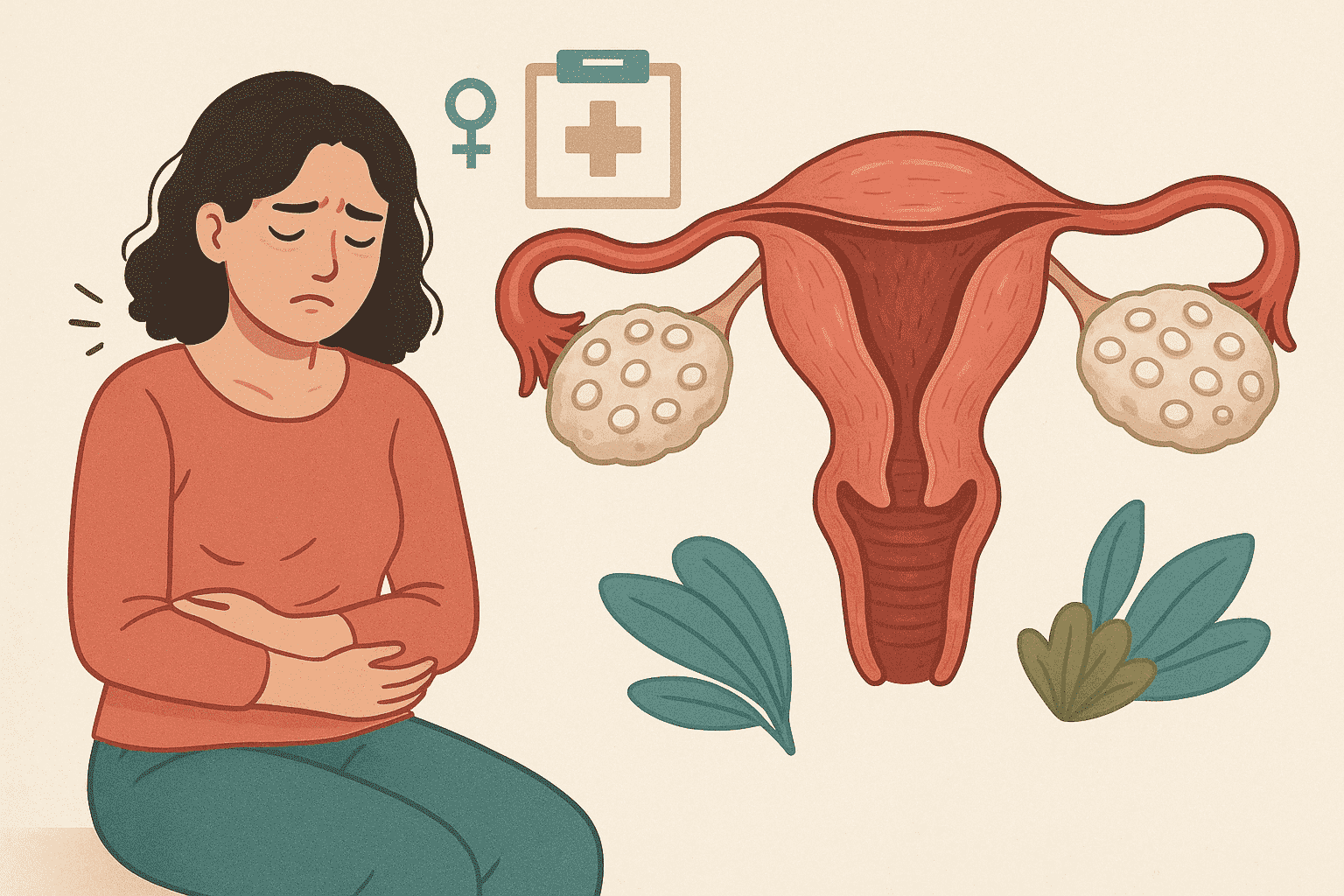“Exploring Its Effects on Women’s Health and Quality of Life“
PCOS represents a leading hormonal disorder among women worldwide. Between 5% and 10% of women who are of reproductive age experience PCOS according to estimates. Patients with this condition may experience irregular menstrual cycles together with weight gain and acne and also increased hair growth and fertility issues. The incidence of PCOS continues to increase and medical research now shows that lifestyle factors including diet choices, physical activity levels and stress management play a major role in both the development and treatment of this condition.
PCOS and its Prevalence
A woman develops PCOS when her ovaries produce excessive male hormones known as androgens which disrupts her hormonal balance. Women with PCOS typically face challenges with irregular menstrual cycles alongside ovarian cysts and experience problems with conception. The exact cause of PCOS remains unidentified but potential contributing factors include genetic components along with insulin resistance and environmental elements.
New research indicates that PCOS affects as many as 20% of women globally which means its occurrence is more common than experts previously estimated. The prevalence of PCOS rises because of lifestyle adjustments along with delayed childbirth as well as alterations in dietary habits and exercise routines. South Asian, Middle Eastern, and Hispanic women show higher rates of PCOS development compared to other ethnic groups.
Lifestyle and PCOS
Managing PCOS symptoms and achieving better health outcomes depends significantly on lifestyle choices. Diet choices alongside regular exercise and stress control techniques can heavily influence the intensity of PCOS symptoms and reduce associated health risks.
1. Diet and Nutrition
A balanced diet full of proper nutrients regulates hormones and insulin levels while also diminishing PCOS symptoms. Insulin resistance frequently occurs in women with PCOS which results in their bodies showing poor responses to insulin hence causing elevated insulin concentrations. Increased production of androgens will worsen symptoms such as acne and excessive hair growth.
A diet minimizing refined sugars and processed foods aids in boosting insulin sensitivity. Nutrition experts recommend eating foods that are high in fiber together with lean sources of protein and healthy fats along with lowglycemic index options. Here are some dietary guidelines to consider:
Women with PCOS who experience insulin resistance benefit from low glycemic index foods because they help maintain stable blood sugar levels. Whole grains, legumes and nonstarchy vegetables serve as examples of foods suitable for this dietary plan.
Chicken, fish, tofu, and legumes provide lean proteins which assist in controlling hunger levels and maintaining stable blood sugar levels.
Sources including avocados, olive oil, nuts, and seeds provide healthy fats which help to maintain hormonal balance and reduce bodily inflammation.
2. Stress Management
Chronic stress can worsen PCOS symptoms. When stress occurs it boosts cortisol production which then disturbs the precise equilibrium between different body hormones. Elevated cortisol levels result in abdominal weight gain and impaired metabolic function.
Regular engagement in mindfulness activities such as meditation, yoga and deep breathing exercises has been proven to effectively lower stress levels. Adhering to a consistent sleep routine and dedicating time to relaxation activities supports hormonal balance which helps manage PCOS symptoms effectively.
Exercise and PCOS: The Key to Management
One of the best strategies to handle PCOS and its symptoms includes regular exercise. Physical activity helps in several ways, including:
- Physical activity strengthens insulin response in the body which helps prevent type 2 diabetes.
- Physical activity can assist women with PCOS in maintaining their weight since weight management represents a common issue for them. Excess weight can worsen PCOS symptoms but losing 510% of body weight can restore menstrual regularity and enhance fertility.
- Women with PCOS experience reduced inflammation levels when they engage in regular exercise which helps prevent hormonal imbalances and mitigates other health complications.
- Exercise triggers endorphin release which enhances mood while reducing anxiety and depression symptoms frequently seen in women with PCOS.
- Women with PCOS should focus on specific exercise routines to improve their condition.
- Walking, running, swimming, and cycling count as aerobic exercises which enhance cardiovascular fitness while burning calories and reducing insulin resistance.
- Weightlifting exercises and bodyweight movements produce muscle growth that boosts metabolism and helps maintain normal blood sugar levels.
- Yoga and Pilates function as lowimpact workouts that enhance flexibility and stress reduction while helping to control PCOSrelated hormonal imbalances.
Exercise Tips for Success
Regular physical activity must become a consistent habit to achieve longterm results. Strive to achieve 30 minutes of moderate physical activity on most weekly days for optimal results.
Begin with lowimpact exercises such as walking and swimming when starting a new exercise routine before adding more intensity as you progress.
Mixing aerobic exercises with strength training leads to optimal benefits for weight management along with better insulin sensitivity and muscle building.
Incorporating Lifestyle Changes into Your Routine
Adapting your lifestyle requires effort but taking small consistent actions leads to permanent benefits. These strategies will help you implement these changes efficiently.
Begin with straightforward achievable objectives. Begin by consuming whole foods more regularly and commit to 15 minutes of exercise daily before you work toward longer sessions at higher intensity levels.
Maintain a journal to record your symptoms along with your exercise routines and dietary habits for better tracking. By monitoring your progress you can discover patterns that help maintain your motivation.
Women with PCOS can obtain essential guidance and motivation through participation in support groups or professional assistance from healthcare providers and nutritionists.
Conclusion
Many women around the world experience PCOS but it becomes manageable through appropriate lifestyle modifications. Managing symptoms and enhancing overall health becomes significantly more achievable through a balanced diet combined with regular exercise and stress management practices. Physical activity routines that combine aerobic and strength training exercises benefit women with PCOS when combined with an insulin sensitivity focused diet. Through these lifestyle adjustments women gain control over their health which in turn lessens PCOS’s negative effects on their lives.
Infographic Content Outline
PCOS Overview: Definition and Prevalence of PCOS, Symptoms of PCOS
Diet Recommendations: Low Glycemic Foods, Lean Proteins, Healthy Fats
Exercise Benefits: Weight Management, Improved Insulin Sensitivity, Stress Reduction
Types of Exercise: Aerobic: Walking, Cycling, Running
Strength Training: Weightlifting, Bodyweight Exercises, Yoga, and Pilates for Flexibility
Lifestyle Tips for Managing PCOS: Consistency in Exercise, Realistic Health Goals, Stress Management Techniques.
– Dr. Prachi Oza
Assistant Professor, Department of Physiotherapy, Madhav University

